Christians today have access to a wealth of literary resources on just about any subject. I have compiled a list of books on a few subject that may be of interest. They are thought provoking and will challenge you to think deeply on a variety of subjects. The heart cannot receive what the mind cannot conceive.
- Faith
- Bible Study
- History
- Theology
- Youth
- Mission
- Heaven
- Leadership
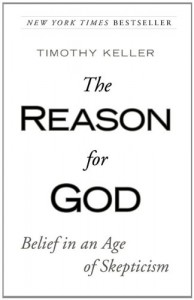 |
The Reason for God
Tim KellerFor years, Keller has compiled a list of the most frequently voiced “doubts” skeptics bring to his Manhattan church. And in The Reason for God, he single-handedly dismantles each of them. Written with atheists, agnostics, and skeptics in mind, Keller provides an intelligent platform on which true believers can stand their ground when bombarded by the backlash. |
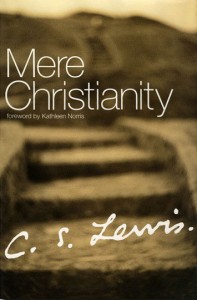 |
Mere ChristianityMere Christianity is C.S. Lewis's forceful and accessible doctrine of Christian belief. First heard as informal radio broadcasts and then published as three separate books - The Case for Christianity, Christian Behavior, and Beyond Personality - Mere Christianity brings together what Lewis saw as the fundamental truths of the religion. Rejecting the boundaries that divide Christianity's many denominations, C.S. Lewis finds a common ground on which all those who have Christian faith can stand together, proving that "at the centre of each there is something, or a Someone, who against all divergences of belief, all differences of temperament, all memories of mutual persecution, speaks the same voice."“Imagine yourself as a living house. God comes in to rebuild that house. At first, perhaps, you can understand what He is doing. He is getting the drains right and stopping the leaks in the roof and so on; you knew that those jobs needed doing and so you are not surprised. But presently He starts knocking the house about in a way that hurts abominably and does not seem to make any sense. What on earth is He up to? The explanation is that He is building quite a different house from the one you thought of - throwing out a new wing here, putting on an extra floor there, running up towers, making courtyards. You thought you were being made into a decent little cottage: but He is building a palace. He intends to come and live in it Himself.”
― C.S. Lewis, Mere Christianity |
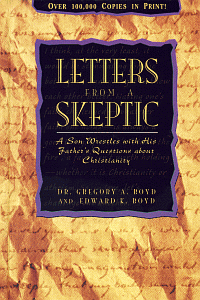 |
Letters from a Skeptic
Greg Boyd and his father, Ed, were on opposite sides of a great divide. Greg was a newfound Christian, while his father was a longtime agnostic. So Greg offered his father an invitation: Ed could write with any questions on Christianity, and his son would offer a response.
Letters from a Skeptic contains this special correspondence. The letters tackle some of today's toughest challenges facing Christianity, including
Do all non-Christians go to hell?
How can we believe a man rose from the dead?
Why is the world so full of suffering?
How do we know the Bible was divinely inspired?
Does God know the future?
Each response offers insights into the big questions, while delivering intelligent answers that connect with both the heart and mind. Whether you're a skeptic, a believer, or just unsure, these letters can provide a practical, common-sense guide to the Christian faith. |
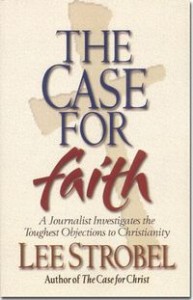 |
The Case for Faith
In his #1 best-seller The Case for Christ, legally trained investigative reporter Lee Strobel examined the claims of Christ, reaching the hard-won verdict that Jesus is God's unique son.
But despite the compelling historical evidence that Strobel presented, many people grapple with serious concerns about faith in God. As in a court of law, they want to shout, "Objection!" They say, "If God is love, then what about all the suffering in our world?" Or, "If Jesus is the door to heaven, then what about the millions who have never heard of him?" Or, "If God cares for everyone, then why does he eternally torture some in hell?"
In The Case for Faith, Strobel turns his tenacious investigative skills to the most persistent emotional objections to belief--the eight "heart" barriers to faith. The Case for Faith is for those who may be feeling attracted to Jesus but who are faced with formidable intellectual barriers standing squarely in their path. For Christians, it will deepen their convictions and give them fresh confidence in discussing Christianity with even their most skeptical friends. |
 |
The Case for Christ
Is there credible evidence that Jesus of Nazareth really is the Son of God? Retracing his own spiritual journey from atheism to faith, Lee Strobel, former legal editor of the Chicago Tribune, cross-examines a dozen experts with doctorates from schools like Cambridge, Princeton, and Brandies who are recognized authorities in their fields. Strobel challenges them with questions like How reliable is the New Testament? Does evidence exist for Jesus outside the Bible? Is there any reason to believe the resurrection was an actual event? Strobel's tough, point-blank questions make this remarkable book read like a captivating, fast-paced novel. But it's not fiction. It's a riveting quest for the truth about history's most compelling figure. What will your verdict be in The Case for Christ? |
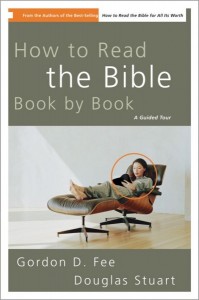 |
How to Read the Bible Book by Book
Gordon D. Fee & Douglas Stuart Two top evangelical scholars take readers through Scripture, one book at a time. For each book, a brief snapshot is given, and then the view is expanded to help readers understand key elements and themes, as well as how the book fits into the grand narrative of redemptive history. A helpful reference for anyone looking to become familiar with every book of the Bible. |
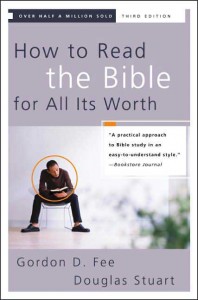 |
How to Read the Bible for All It’s Worth
Gordon D. Fee & Douglas StuartBible 101 for the modern layperson. In language that is both simple and clear, the authors walk readers through the common difficulties and misunderstandings of studying the Bible. Especially useful when read in conjunction with How to Read the Bible Book by Book. |
|
The Prodigal God
Tim KellerKeller uses Jesus’s parable of the prodigal son in Luke 15 to reveal an unexpected message of hope and salvation. The Prodigal God challenges both the devout and skeptics to see Christianity in a new way. |
|
Gospel for Real Life
Jerry Bridges The gospel provides for our eternal salvation, but how does it benefit us day to day? Bridges explains to readers how the gospel transforms Christians into Christlikeness each and every day. |
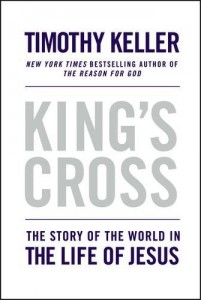 |
King's Cross
Tim Keller King’s Cross “is an extended meditation on the historical Christian premise that Jesus’s life, death, and resurrection form the central event of cosmic and human history as well as the central organizing principle of our own lives.” His aim, which I believe he accomplishes, is to show that the life of Jesus (and his death and resurrection) explains our lives. This theme appears again and again as, in each chapter, Keller brings the reader around to the love of God we find only in Jesus. If you’ve read any of his other recent books, you know that this is vintage Keller.The book is truly an exegetical sermon on the Gospel of Mark. Keller never deviates from the text, but walks slowly through Mark’s Gospel with an insightful and engaging style. This is not an academic book, but as we’ve come to expect from Keller’s books, you will be intellectually challenged and emotionally broken. He has a way of speaking to both the heart and mind that is extraordinary, and is one of the marks of a truly great preacher. In fact, young and aspiring preachers would do well to study Keller’s style and work, learning from him all that they can. His books have taught me to, above all, remain Christ-centered in my preaching, no matter the text. If all of Scripture points to Jesus, then so must all of our preaching. |
|
|
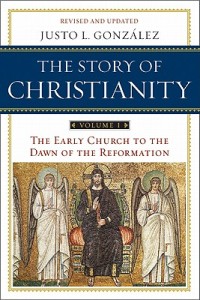 |
The Story of Christianity
Justo L. GonzálezThis volume relates the dramatic events, the colorful characters, and the revolutionary ideas that shaped the first fifteen centuries of the church’s life and thought. González skillfully weaves details from the lives of prominent figures tracing core theological issues and developments within the various traditions of the church. The Story of Christianity demonstrates at each point what new challenges and opportunities faced the church and how Christians struggled with the various options open to them, thereby shaping the future direction of the church. |
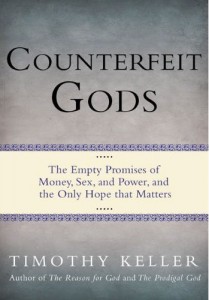 |
Counterfeit Gods
Tim Keller Success, true love, and the life you’ve always wanted. Many of us placed our faith in these things, believing they held the key to happiness, but with a sneaking suspicion they might not deliver. The recent economic meltdown has cast a harsh new light on these pursuits. In a matter of months, fortunes, marriages, careers, and a secure retirement have disappeared for millions of people. No wonder so many of us feel lost, alone, disenchanted, and resentful. But the truth is that we made lesser gods of these good things -gods that can’t give us what we really need. There is only one God who can wholly satisfy our cravings- and now is the perfect time to meet him again, or for the first time. The Bible tells us that the human heart is an “idol- factory,” taking good things and making them into idols that drive us. In Counterfeit Gods, Keller applies his trademark approach to show us how a proper understanding of the Bible reveals the unvarnished truth about societal ideals and our own hearts. This powerful message will cement Keller’s reputation as a critical thinker and pastor, and comes at a crucial time-for both the faithful and the skeptical. |
|
Forgotten God
Francis ChanA follow up to the profound message of Crazy Love, Pastor Francis Chan offers a compelling invitation to understand, embrace, and follow the Holy Spirit’s direction in our lives. |
|
Radical
David Platt WHAT IS JESUS WORTH TO YOU? It’s easy for American Christians to forget how Jesus said his followers would actually live, what their new lifestyle would actually look like. They would, he said, leave behind security, money, convenience, even family for him. They would abandon everything for the gospel. They would take up their crosses daily… BUT WHO DO YOU KNOW WHO LIVES LIKE THAT? DO YOU? In Radical, David Platt challenges you to consider with an open heart how we have manipulated the gospel to fit our cultural preferences. He shows what Jesus actually said about being his disciple–then invites you to believe and obey what you have heard. And he tells the dramatic story of what is happening as a “successful” suburban church decides to get serious about the gospel according to Jesus. Finally, he urges you to join in The Radical Experiment –a one-year journey in authentic discipleship that will transform how you live in a world that desperately needs the Good News Jesus came to bring. |
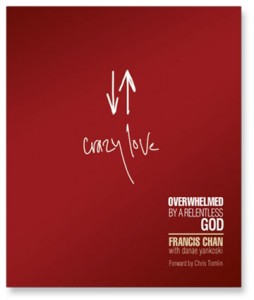 |
Crazy Love
Francis Chan Crazy Love is an invitation to readers to a new recognition of God’s “crazy love” for His people, and to a radical response in kind. In simple language, Chan calls Christians out of lukewarmness and into a life of reckless abandonment for the cause of the Gospel. |
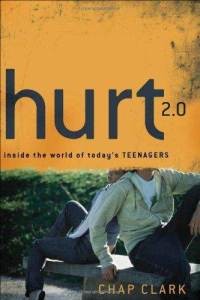 |
Hurt
Chap Clark Based on six months of participant-observer research at a California public school, this book offers a somewhat troubling but insightful snapshot of adolescent life. It will surprise and enlighten parents, youth workers, counselors, pastors, and all who want to better understand the hearts and minds of America’s adolescents. |
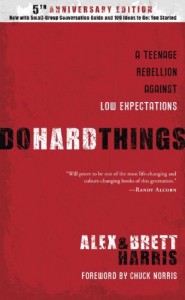 |
Do Hard Things
Alex & Bret HarrisA generation stands on the brink of a “rebelution.” A growing movement of young people is rebelling against the low expectations of today’s culture by choosing to “do hard things” for the glory of God. And Alex and Brett Harris are leading the charge. Do Hard Things is the Harris twins’ revolutionary message in its purest and most compelling form, giving readers a tangible glimpse of what is possible for teens who actively resist cultural lies that limit their potential. |
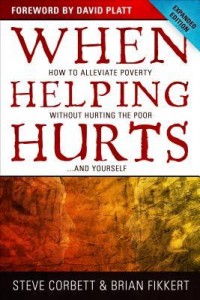 |
When Helping Hurts
Steven Corbett & Brian Fikkert Churches and individual Christians typically have faulty assumptions about the causes of poverty, resulting in the use of strategies that do considerable harm to poor people and themselves. When Helping Hurts provides foundational concepts, clearly articulated general principles and relevant applications. The result is an effective and holistic ministry to the poor, not a truncated gospel. |
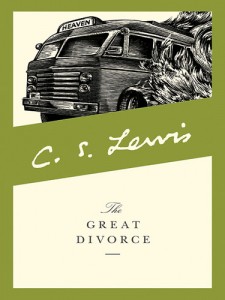 |
The Great DivorceClive Staples LewisThe Great Divorce is a work of theological fantasy by C. S. Lewis, in which he reflects on the Christian conception of Heaven and Hell.The narrator inexplicably finds himself in a grim and joyless city, the "grey town", which is either Hell or Purgatory depending on how long one stays there. He eventually finds a bus for those who desire an excursion to some other place (and which eventually turns out to be the foothills of Heaven). He enters the bus and converses with his fellow passengers as they travel. When the bus reaches its destination, the passengers on the bus — including the narrator — are gradually revealed to be ghosts. Although the country is the most beautiful they have ever seen, every feature of the landscape (including streams of water and blades of grass) is unyieldingly solid compared to themselves: it causes them immense pain to walk on the grass, and even a single leaf is far too heavy for any to lift. |
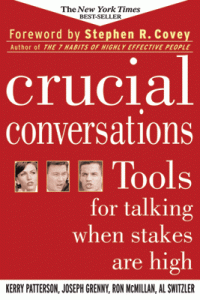 |
Crucial Conversations Tools for Talking When Stakes Are HighKerry Patterson, Joseph Grenny, Ron McMillan, Al Switzler Learn how to keep your cool and get what you want when emotions flare.When stakes are high, opinions vary, and emotions run strong, you have three choices: Avoid a crucial conversation and suffer the consequences; handle the conversation badly and suffer the consequences; or read Crucial Conversations and discover how to communicate best when it matters most. This wise and witty guide gives you the tools you need to step up to life's most difficult and important conversations, say what's on your mind, and achieve positive outcomes that will amaze you. You'll learn how to:· Prepare for high-impact situations with a six-minute mastery technique· Make it safe to talk about almost anything· Be persuasive, not abrasive· Keep listening when others blow up or clam up
· Turn crucial conversations into the action and results you want
Whether they take place at work or at home, with your neighbors or your spouse, crucial conversations can have a profound impact on your career, your happiness, and your future. With the skills you learn in this book, you'll never have to worry about the outcome of a crucial conversation again. |
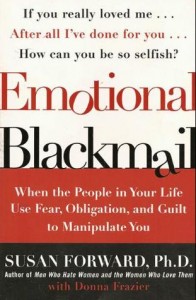 |
Emotional Blackmail
When the People in Your Life Use Fear, Obligation, and Guilt to Manipulate You"If you really loved me” "After all I’ve done for you. . ." "How can you be so selfish. . ."Do any of the above sound familiar? They’re all examples of emotional blackmail, a powerful form of manipulation in which people close to us threaten to punish us for not doing what they want. Emotional blackmailers know how much we value our relationships with them. They know our vulnerabilities and our deepest secrets. They are our mothers, our partners, our bosses and coworkers, our friends and our lovers. And no matter how much they care about us, they use this intimate knowledge to give themselves the payoff they want: our compliance.This book does a very clear job of defining emotional blackmail so you can begin to easily spot emotional blackmailers in your life. It then concludes with telling you specifically how to deal with emotional blackmail, that is, how to keep your energy, resources, and sometimes your very soul, from being stolen by them.
Something that was particularly important for me personally in the book was the part at the end where she talks about not emotionally blackmailing *yourself*! What an insight! I realized that even when rigid, controlling people are not around to inspire guilt, fear and shame in me to get me to do things that are hurtful to me for their selfish benefit, I have a "voice" in my head that does the job for them, telling me that whatever I do that doesn't fit the world view of past and present blackmailers is "wrong," "selfish," or even "evil." So I beat myself up on behalf of my blackmailers even when they are not around to do it.
I also was impressed by the insight that not only does it "take two to tango," that no one can blackmail me if I don't let them, but that it is also possible for me to actually "train" people to blackmail me. This is particularly, true, I think, for those of us raised in rigid, controlling homes with emotionally blackmailing parents. Thereafter, we are, so to speak, fertile ground for any future emotional blackmailers. |




















0 Comments